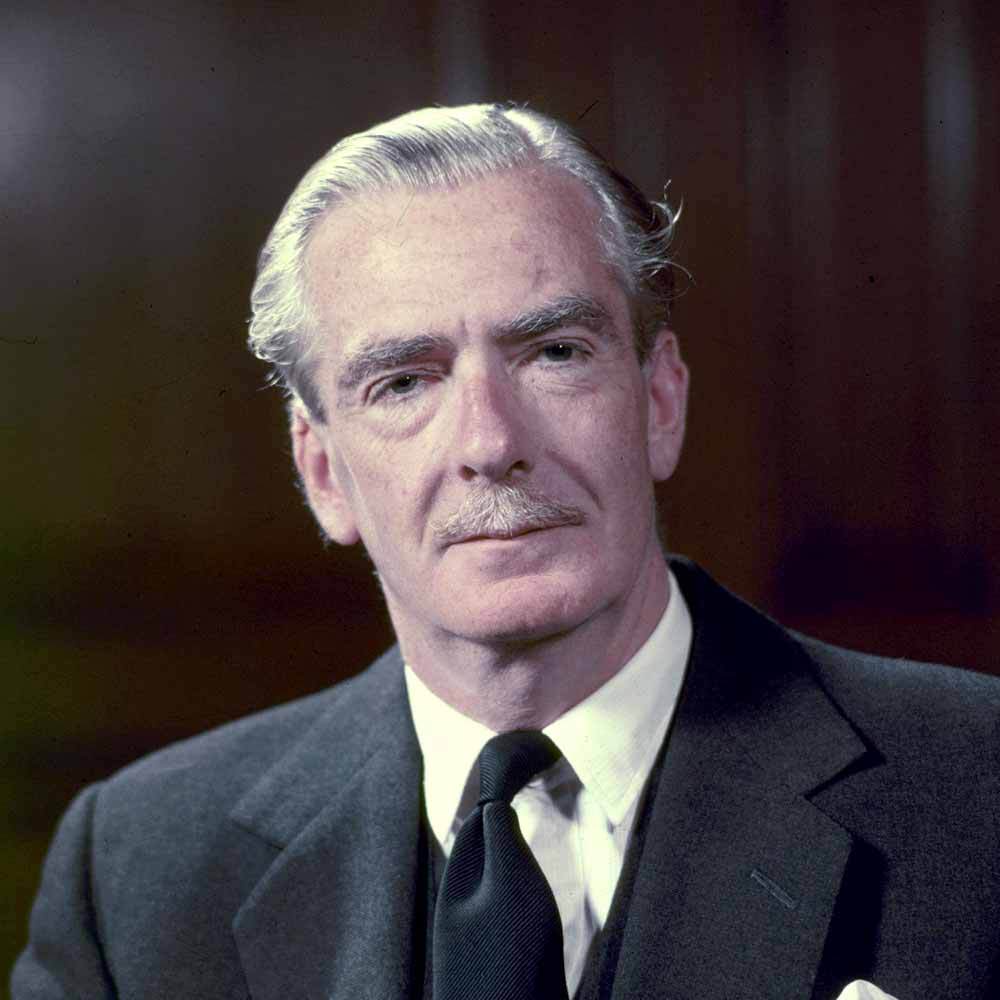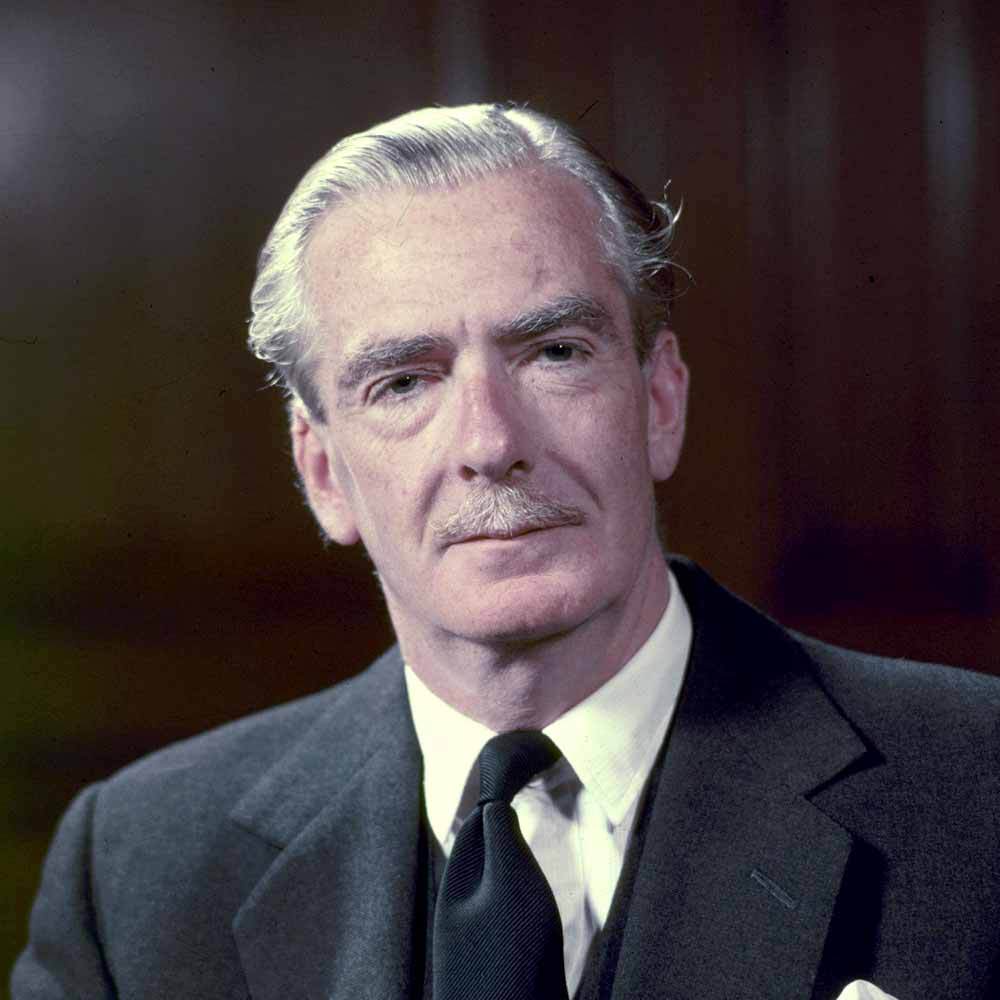Finest Hour 172
The Conscience of Politics: Sir Anthony Eden as Heir Apparent

June 12, 2016
Finest Hour 172, Spring 2016
Page 17
By D. R. Thorpe
“If you want to succeed in politics,” Lloyd George is said to have observed, “you must keep your conscience well under control.
 As Churchill approached the twilight of his final Premiership in his eighty-first year, it proved an apt precept. His relationship with the two figures who were eventually to follow him as Prime Minister—Anthony Eden and Harold Macmillan— became increasingly fractious.
As Churchill approached the twilight of his final Premiership in his eighty-first year, it proved an apt precept. His relationship with the two figures who were eventually to follow him as Prime Minister—Anthony Eden and Harold Macmillan— became increasingly fractious.
In 1955 it was fifty-five years since Churchill had first entered Parliament, and he did not find enticing the prospect of going gently into the political night. Eden and Macmillan, respectively Foreign Secretary and Minister of Defence, both felt that Churchill had overstayed his welcome, and were increasingly seen by the aged Prime Minister as rivals, rather than colleagues.
Crown Prince
How different things were in 1938 at the time of Chamberlain’s meeting with Hitler at Munich when Eden and Macmillan were staunch opponents of appeasement. Churchill regarded them both as loyal, even heroic, figures, famously describing Eden as “the one strong figure standing up against long dismal, drawling tides of drift and surrender.”1 On 16 June 1942 Churchill advised King George VI that in the event of his death, “He should entrust the formation of a new government to Mr Anthony Eden.”2 Eden ruefully stated in his memoirs: “The long era as Crown Prince was established, a position not necessarily enviable in politics.”3 The Treasury benches are full of the bleached bones of future Prime Ministers. It would be thirteen years before Eden succeeded Churchill in Number 10.
As Foreign Secretary from December 1940 to July 1945, Eden was Churchill’s closest political ally. The relationship had its differences, and Eden was often exasperated by Churchill’s intransigence. Privately, he was mortified by the way Churchill treated the Poles at the Yalta Conference in February 1945, nor did he share Churchill’s confidence that Stalin “meant well to the world and to Poland.”4 At the subsequent Potsdam Conference in July 1945, Eden was not confident that Churchill would have command of all the technical detail and sent him a detailed summary of the issues that Stalin would seek to control.

2025 International Churchill Conference
On 25 July 1945, Churchill and Eden returned to England for the result of the General Election, believing that they would come back later in the week. As the Labour Party won a landslide victory, this was not to happen, and they were replaced by Clement Attlee and Ernest Bevin. The central question for the Conservative Party now was the whether Churchill would resign as leader. His wife, Clementine, had “longed for him to retire.”5 Many in the Conservative Party, both in the depleted Parliamentary ranks, and in the country, thought likewise. Churchill was conscious, however, that, as with Neville Chamberlain (and Arthur Balfour from an earlier era), he had never been elected as Prime Minister, and now, to exorcise that particular demon, he wanted to remain and fight on.
Churchill’s promise to Eden that he would not make Lloyd George’s mistake of staying on after the war soon had a very hollow ring. This was doubly unfortunate for Eden. Not only did he have to wait—and wait and wait—to become prime minister, but also on him devolved the daily grind of Opposition leadership during these years of austerity, whilst Churchill wrote his war memoirs, relaxed with his painting, and made global utterances. Eden found the famous Iron Curtain speech at Fulton in 1946 inflammatory and unhelpful, and the question of “Europeanism” that Churchill spoke of in Strasbourg in 1949 too ambiguous. Of Churchill’s possible retirement there was no sign. “I rather feel,” Eden wrote, “that his present inclination is to go on with everything for as long as he can.”6
Staying On
When Churchill became Prime Minister again after the October 1951 General Election, Eden was reappointed Foreign Secretary, even though much of his reforming work in Opposition had been on domestic issues, such as property owning democracy. The mistaken assumption was that Churchill would step down before too long in favour of Eden. It was not to be, even though Eden married Churchill’s niece Clarissa in August 1952.
Many commentators believed that marrying Clarissa would give Eden political advantages, thinking that Churchill’s heir apparent had underlined his claims now that he was Churchill’s nephew-by-marriage. Things were not so simple. Becoming “family” had added a further layer to Eden’s already complex relationship with “Uncle Winston.” Business and family do not always mix, and Eden felt a degree of reserve, as Churchill clung limpet-like to office, over the extent to which he could press his claims to the succession.
There was always some new pretext for Churchill remaining. King George VI died unexpectedly in February 1952 so Churchill felt it incumbent to “see in” the new, young Queen Elizabeth II. Then, of course, there was the Coronation in June 1953, which Churchill had no intention of missing. By this time Eden had suffered a near fatal botched gallbladder operation and was receiving remedial surgery in Boston. Shortly after the Coronation, Churchill suffered a stroke and was confined to Chartwell until the autumn, press secrecy being maintained by Lords Beaverbrook and Rothermere. Had he not recovered, the Premiership could well have passed to Rab Butler, the Chancellor of the Exchequer.7
Churchill was determined to celebrate his eightieth birthday in Number 10 in 1954. After all, Gladstone had been Prime Minister in his eighty-fifth year. Even when Churchill had tentatively agreed to step down in 1955, there were always further reasons for staying on and reneging on his promise, notably his belief that he was the only Western politician able to organise a summit with the Russians. Eden, remembering Churchill’s ill-preparedness at both Yalta and Potsdam, had long been wary of such a prospect, and on the eve of travelling to Boston for further operations, he warned: “Don’t appease that Russian bear too much in my absence.”8
The Unkindest Cut
Various theories have been advanced in regarding Churchill’s motives in delaying his ultimate retirement. First, it was felt, he believed that Eden deserved his turn as Prime Minister, having been Crown Prince for so long and stayed on to allow him to recover his full strength. Others, though, think he had already decided that Eden, in his current parlous state of health, no longer had the necessary energy and dynamism to be Premier, and as a result he needed to remain and await the emergence of a younger figure from a new generation, a parallel with Attlee’s contemporaneous treatment of Herbert Morrison. After Stalin’s death in 1953, there was always the prospect of a summit with the new Russian leadership, for which Churchill considered himself indispensable. His daughter Mary Soames accepted that he just could not bear the thought of leaving the green room of politics.9
In his last two years in Number 10, Churchill became increasingly tetchy, even cruel, towards Eden. When the severe foot-and-mouth plague occurred in 1953, while Eden was away in Boston, Churchill said in Cabinet to Thomas Dugdale, the Minister of Agriculture, “I’m very worried about this myxomatosis. You don’t think there’s any chance of Anthony catching it?”10 After Eden had negotiated the Suez Canal Base Agreement in 1954, Churchill observed that he did not know that Munich was situated on the Nile, one of the cruellest rebukes imaginable to Eden, who had been such a stalwart anti-appeaser before the war. And later in 1954, with Eden beside him in Cabinet, Churchill explained solemnly that Selwyn Lloyd was away at his father’s funeral. “Quite young too,” he added, “only 90.”11
Selwyn Lloyd was a close observer of Churchill’s deteriorating relationship with Eden. “He and Winston had continued arguments,” Lloyd wrote. “The most painful incident between them was when Anthony was in Geneva for the Indo-China conference. Churchill stalked up and down saying that Anthony was the most selfish man he had ever known, a prima donna, quite impossible to work with.”12 It was not much comfort to Eden when Churchill assured him that if he stepped down as Prime Minister before the General Election (though there was no guarantee of this), he would still stand at the polls, “probably as a Conservative.”13
Starter’s Orders
By this time, the Cabinet, and many in the parliamentary party, were despondent about any resolution to the question of the succession. In the end, Macmillan bravely saw Churchill and told him bluntly that the time had come to step aside. This did not go down well. Churchill subsequently asked Eden how he got on with Macmillan. “Very well, why?” came the response. Churchill replied, “Oh, he is very ambitious.”14
Eventually, 5 April 1955 was decided upon as the date when Churchill would finally tender his resignation to the Queen. The evening before, Churchill hosted a farewell dinner, attended by the Queen and the Duke of Edinburgh, at 10 Downing Street. After the dinner, sitting on his bed and still bedecked, Churchill said to his long-serving secretary John Colville, with some passion, “I don’t believe Anthony can do it.”15
Macmillan thought that Churchill bore much responsibility for this situation. Eden had been Crown Prince for too long in the shadow of Churchill, whilst doing so much of the work, especially during the period 1945–51. Serious, almost fatal, illness had sapped much of his energy. How different the post-war history of Britain would have been if Clementine Churchill had indeed persuaded Churchill to retire in 1945. “The trouble with Anthony Eden,” Macmillan summed up later, “was that he was trained to win the Derby in 1938; unfortunately, he was not let out of the starting stalls until 1955.”16
D. R. Thorpe is the author of major biographies of Anthony Eden, Harold Macmillan, and Sir Alec Douglas-Home.
Endnotes
1. Martin Gilbert, Winston S. Churchill, Volume V, The Prophet of Truth 1922–1939 (London: Heineman, 1976), p. 903.
2. Winston Churchill to King George VI, 16 June 1942, PS GVI C 069/17, Royal Archives, Windsor.
3. Anthony Eden, Full Circle (London: Cassell, 1960), p. 266.
4. War Cabinet Minutes, 19 February 1945, CAB 65/51, National Archives.
5. Mary Soames, Clementine Churchill (London: Cassell, 1979), p. 397.
6. Anthony Eden to Lord Cecil of Essendon, 27 August 1946, Salisbury Papers, Box J 3, Hatfield House.
7. Butler did miss out on the Premiership in both January 1957 and October 1963 but always believed his best chance of becoming Prime Minister was in the summer of 1953 if he had pushed for it. Lord Butler to the author, 20 November 1975.
8. D. R. Thorpe, Eden: The Life and Times of Anthony Eden, 1897–1977 (London: Chatto and Windus, 2003), p. 387.
9. Lady Soames to the author, 20 March 1992.
10. Thorpe, p. 391.
11. Ibid., p. 419
12. D. R. Thorpe, Selwyn Lloyd (London: Chatto and Windus, 1989), pp. 271–72.
13. Thorpe, Eden, p. 419.
14. D. R. Thorpe, Supermac: The Life of Harold Macmillan (London: Chatto and Windus, 2010), p. 296.
15. John Colville, The Churchillians (London: Weidenfeld and Nicholson, 1981), p. 171.
16. Harold Macmillan to the author, 23 April 1975.
Subscribe
WANT MORE?
Get the Churchill Bulletin delivered to your inbox once a month.



